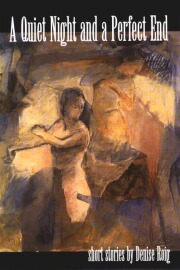
About the book
- Named one of Quill & Quire's 10 Best Books of the Year
- Heard on CBC Radio's "Between the Covers"
About the author

Denise Roig is the author of two critically received collections of short stories: A Quiet Night and a Perfect End (Nuage Editions), and Any Day Now (Signature Editions), and the memoir Butter Cream: A Year in a Montreal Pastry School (Signature Editions). Denise’s first collection was translated in 2000 as Le Vrai Secret du bonheur (Éditions de la Pleine Lune) and her fiction has been heard on CBC’s Between the Covers. As a journalist, Denise’s work has appeared in The Gazette (Montreal) and The National (Abu Dhabi). Denise is the co-editor, with her husband Raymond Beauchemin, of two anthologies of Quebec English literature: Future Tense and The Urban Wanderers Reader.
Born in New York, raised in Los Angeles, and a longtime resident of Montreal, Denise moved to Abu Dhabi, capital of the United Arab Emirates, in 2008. She now lives in Hamilton, Ontario.
Excerpt
from "The Real Secret of Happiness"
My father liked three things in life: Louis Armstrong, watering the lawn and burning trash. The rest, he said, was stupid. Stupid was one of his favorite words.
We grew up, my two brothers and I, in a motel on a lake. It was a plain kind of building, white wood with green trim like a thousand other motels you pass on the highway in northern Idaho. But the lake was pretty. Big, too, shaped almost like a heart. You couldn't tell the shape from standing on the edge. You had to see it on a map.
My father did the books. My mother did the rooms. I did the linens because I was the oldest and the only girl. I washed and folded the sheets every Saturday and Sunday afternoon. I learned about life from those sheets, about places other than the lake and about people other than my family. Sometimes I found lipstick stains or blood. Once I even found two snails tied up in the corner of a queen-size flat.
The motel was called "Sleepy Hollow" and it was. It was both really. Except for seven or eight weeks every summer when our circular driveway was filled with station wagons and men calling to each other over the roofs of their cars— "Hey, Hal! Number two's vacant. Remember number two? Ha, ha!" Big guys with white legs and bermudas that hung low under bellies that said, "I'm a man. Watch it." Until you looked at their red, plain faces, their sunburned ears, their puffy hands. Then they were just boys come to the lake for a good time.
They came without wives and kids. "For a good fff-fish," they'd tell my father, and then laugh, and elbow him, turning pink with their naughty boyness. "This is the place," my father always said. "You want a good fff-fish, this is it."
They usually arrived late in the afternoon as my mother stood sweating in the kitchen, waiting for the cake to come out of the oven. We ate a cake a night in those years. My brothers could down five, six pieces at once, a dozen if there'd been enough. My mother, who was 5'10" and still had the two-dimensional figure of the Sears Catalog model she'd been in her life before us, would duck and look out the window when she heard tires on the gravel. "It's them," she'd say, and go back to watching the cake—Cherry Angel Food or Double Dutch Chocolate, always some mix—through the square porthole of the oven. It was a small kitchen built for a smaller woman. She was always ducking. My father would be out in front watering the lawn when the station wagons pulled up. He watered slowly, without rush, using his fingers to splay out the water for the pansies that rimmed our yard. He'd be there—in khaki pants and golf cap—barefoot, deep in the lawn. Sometimes the cars bumped each other, the men blasting their horns, bouncing against each other's fenders. "Bernie! Fuck off! Hey, guy!"
And my father would keep watering for a few more minutes, surveying them from the slight incline of the lawn. Then he'd raise his arm, the hose in his hand releasing an arc of water into the grass. It was the farthest he'd go to greet people. The men—one or two that were the ringleaders, usually the largest and loudest—would come up the lawn and shake his free hand.
"Hi, there. I'm Jack. This here's Larry. That's Gil in the Winnebago."
"Right," my father said to the mass of manhood collected on his lawn.
"Great weather, nice place," someone would say.
"Right," said my father. And then they'd follow him through the door marked "Office," the service porch where my father kept all the keys.
He hated them. He called them the brainless ones, the zits of the world and worse. I heard him call one a cocksucker once when he thought we kids were watching TV in the other room. I was coming into the kitchen to get a last piece of cake and I heard the word. Cocksucker. It held its own in the kitchen, like someone taking up space, like a person leaning against the kitchen sink. "Sam," my mother warned. "Jeanette," my father warned back. They could use each other's names as weapons.
"Sis knows what I mean anyway, don't you, Sis?" and my father stuck out his foot and put it on mine, a gesture meant to be affectionate. "She doesn't suffer fools anymore than I do, do you, Sis?" And I shrugged, took the cake and left. I couldn't bear at 15 to openly agree with anything either of them said.
"What's to hate?" my mother sometimes asked over dinner when my father was ripping into the lame brains, the armpits, the assholes. "It's not hate," he'd say. "It's more like," he paused, steak in his mouth. "More like repulsion."
"It's rude," my mother insisted. "We need them. We need their business. Try and be nice."
"Nice, nice, nice," my father said. "Nice is stupid." And he went outside and watered the lawn even though he'd already done it earlier that evening. And then later, much later, when we'd all gone to our own rooms, we might hear "What a Wonderful World," Satchmo himself taking up residence in the den.
It wasn't really a den, my mother just called it that. It was more like a screened-in porch where my father kept the hi-fi and a pile of old records. There was just one chair in there, a La-Z-Boy in crushed brown velour. My father would lie way back in that chair, waving one hand back and forth like he was conducting. The other hand held a glass. Most of the time I couldn't actually see the glass, but I knew it would be full. Something pale yellow. He didn't sing along with old Louis. He didn't even close his eyes. He just waved his free hand. "What a wonderful world."
Reviews
“Roig's first short story collection, the wonderfully titled A Quiet Night and a Perfect End, is invested with the kind of compassion for its characters and honesty about their actions that is not just rare but unheard of in a…” >>
— Quill & Quire
“These are delicate but solid, weight-bearing stories.” >>
— Grace Paley
“A Quiet Night and a Perfect End is anything but predictable. In story after story, Roig avoids easy drama and through apparently simple narratives, reaches deep into the human psyche, probing with refreshing delicacy the fragile balance of the human…” >>
— The Montreal Gazette
“These wonderful stories are about distance and loss: children move away, husbands leave, babies die. There is such quiet pain here and yet, and yet, there is a sense that the searching and seeking, the pain and bewilderment are worth…” >>
— Audrey Thomas











 Back to top
Back to top